- Home
- Leslie Meier
Christmas Card Murder Page 9
Christmas Card Murder Read online
Page 9
Lucy nodded her assent. She was still terrified, but she felt somewhat reassured that she and Phyllis had a good chance of getting out of this situation alive. Losing the car was a small price to pay, she decided, concentrating on those deep, regular breaths. She could see a bit more now, since her eyes had adjusted to the dark. The moon was out, too, and its dim light was reflected on the snow. She could make out Phyllis’s shape, behind her desk, as well as Ratcliffe, who was standing by the window, peering out at the street. When he whirled about suddenly, she flinched.
“Is there any food? Anything to eat?”
Lucy thought it was worth trying to get the gag off her mouth, so she nodded and made a noise in her throat, trying to communicate the message that she’d tell him if he removed the tape.
“Don’t yell, okay?”
She nodded again and he gave the tape a painful yank, which she figured meant she certainly wouldn’t need to wax her upper lip anytime soon. “There are some crackers on the shelf under the coffeepot.”
Once again he searched the office with the flashlight until he found the coffee station and the two packs of crackers. “Is this all?”
“Sorry.” Lucy spoke softly, careful not to alarm her captor. “You can take the tape off Phyllis’s mouth, too. She won’t make a peep.”
“That so?” he demanded, lighting Phyllis’s face and getting a nod.
“Okay. But I’m warning you. This tape can go back real fast.”
Phyllis nodded again and he ripped the tape off her mouth, causing her to yelp with pain. Panicked, she gave him a pleading look.
He responded by apologizing, “Uh, sorry.”
“It’s okay,” she whispered, watching with huge eyes as he returned to the window and peered through the old-fashioned wood blinds. Then he ripped open one of the packs of crackers and began eating them.
“What the hell’s keeping them from plowing?” he muttered, his mouth full. “The storm’s over.”
Lucy found herself agreeing with him. She couldn’t imagine why the town’s DPW crew was delaying; they were usually out with the plows the minute the snow stopped falling. She had an awful suspicion that the workers might be getting some rest, since they’d plowed earlier in the day, and would get back on the roads closer to morning. That meant she and Phyllis would be spending a very uncomfortable night. It also meant that Ratcliffe’s escape would be much riskier, since he wouldn’t have the cover of darkness and would have to make his way in daylight. He would know that state police, local police, sheriffs, everybody, would be looking for him; he was an escaped felon, a convicted killer, also a kidnapper, so he’d probably take her or Phyllis with him. He’d figure that a hostage would be his best ticket to freedom.
“So, how did you get away?” she asked, hoping to get him to talk with her. That’s what they said you were supposed to do in the unlikely event that you were taken hostage and she figured it was worth a try. “You had the parole board hearing today, right? I heard it didn’t go so well?”
He snorted and tossed the wrapper on the floor. “A joke. There’s no way I’m ever going to get parole. So when I saw a chance, I took it.”
“What happened?”
“They were taking me out of the building, the courthouse. There were two guards, one on either side of me. It was snowing real hard, you couldn’t see too good, and the one guy slipped and went down. I punched the other guy—”
“Weren’t you handcuffed?”
“Guess they forgot, or maybe they figured it was too much trouble to get ’em on over the gloves and everything. I don’t know. It was a big mistake because I was gone before they knew what happened.” He grinned. “Stupid cops even left the engine running on the van, warming it up.”
“Lucky for you.”
Ratcliffe shrugged and shook his head. “ ’Course I don’t know my way around here, I just followed the best roads, the ones with less snow, but after a while, the snow was too heavy for the van, so I had to hoof it. I saw a sign for this Tinker’s Cove business district, I figured I’d find some shelter. When I got to this street here, I tried the doors and this one opened. I shoulda kept going, found a place with food, maybe a generator.” He started to unwrap the second packet of crackers, then stopped. “Got any water?”
“There’s a cooler over there.”
He clomped across the office and Lucy heard the sound of running water as he filled one of the paper cups. “Say, you want some?” he asked.
“Sure,” said Lucy, shocked to her core by this desperate escaped convict’s thoughtfulness.
He brought a cup over to her and held it while she drank, then did the same for Phyllis.
“Are you sure you’re a ruthless fugitive?” asked Phyllis.
“I’m innocent. I’m not a bad guy. I mean, I’ve done some stuff, but I never saw that girl they said I killed. I was framed. I know everybody says that, but in my case it’s true. I don’t deserve to spend the rest of my life in prison and I’m not going back.” He went back to the window and peered out at the snow-filled street. “I’m not going back, no matter what.”
“What time is it?” asked Phyllis.
“Around five-thirty,” he said, still at the window.
“Any signs of life out there?” asked Lucy. It seemed possible to her that Ratcliffe had been tracked to the office and some sort of operation to capture him might be in the works. Maybe Marcel had noticed something amiss and had gone for help.
“Nuthin’. It’s dead out there.”
So much for that idea, she decided, discarding any thought of rescue. It would be nigh impossible for a SWAT team to get to Tinker’s Cove, much less plan a stealth operation. She resigned herself to a long night in the chair, which was getting pretty uncomfortable. Her legs were beginning to ache and she longed to stretch them. “My legs are cramping,” she said. “Any chance you could loosen them?”
“Uh, no. Sorry. Can’t risk it.”
“Really, you could. I’m not going to cause you any trouble. In fact,” she added, hoping to convince Ratcliffe she wasn’t a threat, “I’m kind of on your side.”
“Right,” he scoffed.
“Really. People get railroaded all the time. I’m a reporter and I’ve seen it happen too often. And I remember your trial. It wasn’t fair. We even printed a letter from a retired prosecutor saying exactly that. There was a lot of anger and grief in the community and people wanted closure. They wanted to blame somebody for Sally Holmes’s murder. The trial should’ve been moved to someplace where there hadn’t been so much news coverage, where people didn’t know the family.”
Ratcliffe stepped back from the window and went over to Ted’s desk, where he plunked himself down heavily into the swivel chair. “Somebody shoulda told that parole board,” he said. “All they heard was a lot of crying from that girl’s family, about how the father can’t work because the mom is sick—she was in this fancy wheelchair—and the brother has PTSD.” He sighed. “I’ve got PTSD every morning when I wake up and see that I’m still in that lousy, stinking cell.”
A noise, the sound of an engine, was heard in the street and Ratcliffe dashed to the window, peeking out. As they listened, the sound grew louder, the scrape of a plow could be heard, and then flashing yellow lights lit up the office. “Finally,” he said. “It’s about time.”
Lucy watched as the light of the plow moved along the window and disappeared down the street, leaving it lit only by the moon once again.
“That’s my ticket,” he exclaimed. “I’m outta here.”
“What about us? You can’t leave us tied up here all night.”
He stared at Lucy. “Okay. This is what I’ll do. I’ll cut one hand loose, if you promise to wait till I’m gone. Then you can work yourself free. Deal?”
“I promise.”
True to his word, Ratcliffe found the scissors in Lucy’s pencil jug and quite carefully snipped some of the tape holding her right hand to the chair. She was still trussed up pretty tightly, but sh
e knew she’d be able to eventually free herself and Phyllis. “Thanks,” she said as he tossed the scissors onto her desk and headed for the door.
“Sayonara,” he declared, opening the door. A sudden bang, a pop, was heard and he was propelled backward onto the floor, where he lay motionless.
A shocked cry escaped from Lucy’s lips and Phyllis’s too. “What the . . . ?” she said as the lights went on and a SWAT team swarmed into the office. Officer Sally Kirwan was right behind them and bounded across the office to Lucy, asking if she was okay. Then she got to work freeing Lucy from the tape. Her uncle, Police Chief Jim Kirwan, was doing the same for Phyllis. A SWAT team member was on his knees, checking Ratcliffe for signs of life. Finding none, he declared, “That was a clean shot. Got him right in the heart.”
Lucy found she was suddenly trembling all over, and tears were filling her eyes. “It’s okay, you’re safe now,” said Sally. “He got what he deserved.”
Lucy wrapped her arms across her chest, hugging herself, and a silver blanket was wrapped around her. She was safe, it was true, but except for those first few minutes when she’d struggled with Ratcliffe and the panic she’d experienced when she found herself in captivity, she’d never really felt in danger. She didn’t know if Ratcliffe was truly innocent or not, nobody could know that, but she didn’t think he deserved to die.
“It’s okay,” repeated Officer Sally.
But Lucy knew it wasn’t. It wasn’t okay.
Chapter Ten
Officer Sally gave Lucy a lift home in the department’s all-wheel-drive truck, chatting excitedly the whole way.
“We had the office under observation right from the start,” she said. “It’s right across the street and you know how it is with a big snowstorm, you keep checking out the window to see if it’s letting up or not. We’d gotten the APB about Ratcliffe escaping from the courthouse, and when Barney saw him staggering down the street and into the newspaper office, we knew where he was. But we knew Phyllis was there, and then you showed up, so we had to figure out what to do. The state cops were really great, they helicoptered the SWAT team in, they landed the copter in the parking lot by the cove, and we made sure there was nothing that would alarm Ratcliffe. We even kept the power off and didn’t plow the street, so he was isolated. It was a brilliant plan, if you ask me. They figured he’d make a run for it as soon as the street was plowed, the tip-off was when he flashed the lights on your car. So the sniper was ready and everybody was in place when he decided to make a run for it.”
“He wasn’t armed,” said Lucy. “They didn’t have to shoot him.”
“Procedure. That kill was completely justified. He was a convicted felon, a murderer, and was considered armed and dangerous. That guard he knocked out has a concussion, and the other one broke his leg. We don’t take chances with guys like that. Believe me, it’s all for the best. Our top priority during the entire op was guaranteeing the safety of the hostages—you and Phyllis.”
Lucy didn’t like feeling that she bore some responsibility for Ratcliffe’s death. Maybe it was the Stockholm syndrome? Maybe she’d begun to believe he might be innocent? Or maybe it was simply her deep conviction that he was a human being, a human being who’d made mistakes, maybe even did terrible things, but that didn’t mean he deserved to be shot. The SWAT team could have easily overpowered him. She thought about it all that sleepless night, reliving the moment when he opened the door and was shot.
* * *
Lucy was up before dawn, clicking away on her laptop in search of that letter from the retired prosecutor that had caused such a flap. When she found it, she discovered with a shock that the author was none other than Howard White, the man she’d interviewed at Heritage House about his former classmate Dorcas Pritchett.
The sun was bright and the roads were nearly clear of snow when Bill gave her a ride into town so she could retrieve her SUV. They worked together to clear the snow from the car and then he left to pick up tile for the master bath at the home center. She returned to Heritage House to finally get the interview she’d been putting off for so long.
“You’re back,” Howard White said, welcoming her to his little efficiency apartment. “Come on in.”
“I met Philip Ratcliffe,” she said, seating herself on his couch.
“I heard, it’s all over the local news,” he said, taking his usual seat, a wing chair angled toward the TV, which was playing NECN. A table next to the chair was piled with newspapers and magazines. “What did you think about him?” he asked, picking up the remote and turning off the TV.
“I don’t know. It’s possible he killed Sally, it’s also possible he was framed. I’m really confused. I can’t believe they shot him dead, right in front of me.” She sighed. “What do you think? You wrote that he didn’t get a fair trial. What’s the remedy? How can we ever have a justice system that’s completely fair? How can we be certain if someone’s innocent or guilty?”
“We can’t,” he replied. “All we can do is try, that’s why the standard is beyond a reasonable doubt. I do believe that people act on their deepest beliefs and convictions, they do try to do the right thing, but we’re all flawed. We all have emotions and prejudices and opinions, and sometimes those things get in the way of impartial, thoughtful judgment.” He tented his fingers and smiled at her. “I never said Ratcliffe was innocent, I only said that he didn’t get a fair trial.” He paused. “I’ve studied it pretty closely and in the end I think he really was guilty.”
“He didn’t seem like a murderer last night,” said Lucy.
Howard shrugged and rubbed his swollen, arthritic knuckles. “He’s probably changed. It all happened over twenty years ago. He may even have repressed memories of the entire thing. He may have truly believed in his innocence. It’s amazing what the human mind can justify, the ways we can rationalize terrible behavior.”
“I know. You’re right.” She stood up to go. “But something’s wrong when you’re taken hostage, and the worst part, the most traumatic part, is getting rescued.”
He chuckled. “I think that may be a more common reaction than you think.” He took her hand. “It could have ended very differently. You were saved. Now go and live your best life.”
“Thanks,” she said, giving his hand a squeeze. “You’ve really helped me.”
“Anytime,” he said with a wave as she stepped through the door and walked down the long hall.
* * *
Lucy was thoughtful as she drove to the office, where she found that Phyllis was taking the day off. “Her husband says she’s pretty shaken up,” said Ted, who was sitting at the antique rolltop desk he inherited from his grandfather. He looked her over. “How are you doing?”
“Okay, I guess,” admitted Lucy. “Still processing everything that happened.”
“That’s understandable.” Ted nodded thoughtfully. “Best way to do that is probably to write about it. How about a first-person account? I can post it online.”
Lucy couldn’t believe what she was hearing. “You’re kidding, right?”
Ted was absolutely serious. “No. I’ll need it in an hour.”
“I’ll do what I can,” said Lucy. “No promises.”
When she settled herself at her desk, where the chair still bore torn strips of cello tape, Lucy had to fight the urge to flee. Instead, she carefully peeled off the tape and wadded it into a ball, then sat down carefully, feeling a bit fragile, as if she might break. I don’t know if I can do this, she thought, fingering the small pile of papers on the desk pad and staring at her blank computer screen.
She bent her head, eyes closed, and concentrated on breathing in and out. She thought of her happy place, the glassy blue pond surrounded by lush green trees that she always pictured when they took her blood pressure. After a bit, imagining that it was 110 over 70, she opened her eyes and saw that Poppy had been true to her word and had faxed her Doris Pritchett’s will.
It was only two pages long, and most of it was the usual leg
alese about settling debts and being in her right mind. Lucy scanned it quickly and got to the important part: the disposition of assets. There she was shocked to see that Doris had left all her worldly possessions to a man named Gilbert Brown. “GB”? The very person who had sent her the Christmas card? On a whim she googled Gilbert Brown and a news story featuring him popped right up.
According to this account, datelined Auburn, New York, he was one of the first persons wrongfully convicted of a crime to be exonerated by DNA evidence uncovered by the Innocence Project. The story said he had originally been misidentified by a witness, who wasn’t named, but who Lucy suspected was Doris Pritchett. Sentenced to life, he served thirty-one years in prison, but was looking forward to starting a new life with his family in Geneva, New York.
Lucy immediately picked up her phone and dialed directory assistance, which provided Gilbert Brown’s number and offered to dial it for her. She could hardly contain her excitement as she listened to the rings; she was finally going to talk to “GB” and get the story behind the Christmas card. However, she was in for a disappointment. In the end all she got was an answering machine’s message. Sighing, she left her name and number, then stood up and got herself a drink of water.
“How’s it going?” asked Ted, looking up from his desk.
“It’s not,” said Lucy, taking a swallow and remembering how Philip Ratcliffe had held the paper cup for her so she could drink. Then she drank the rest, tossed the cup into the trash, and put on her coat.
“What are you doing?” demanded Ted.
“I don’t know, but I’m not doing this,” she said, jamming her hat on her head and walking out the door, avoiding the freshly-scrubbed, but still-stained, place on the floor where Ratcliffe had fallen and bled the night before.
Once out of the office, and in her car, Lucy didn’t know what she wanted to do or where she wanted to go. She finally started the engine and drove the block or two to Sue’s house, not sure that she was even home. When she pulled up in front of the big old Captain’s home, which was lavishly decorated with a huge wreath on the front door and smaller wreaths and electric candles in every window, she saw that Sue was just leaving. She honked the horn and Sue joined her in the car, leaning across the center console and giving her a hug.

 Christmas Card Murder
Christmas Card Murder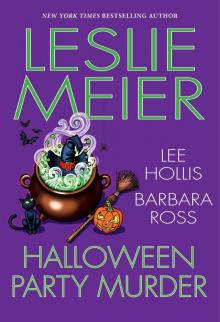 Halloween Party Murder
Halloween Party Murder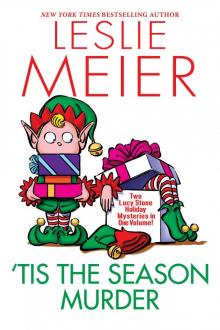 'Tis the Season Murder
'Tis the Season Murder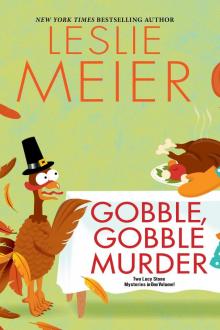 Gobble, Gobble Murder
Gobble, Gobble Murder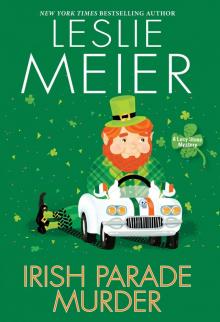 Irish Parade Murder
Irish Parade Murder Bake Sale Murder
Bake Sale Murder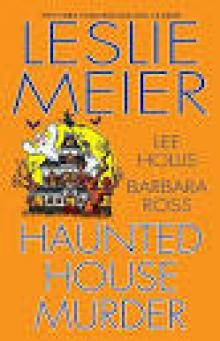 Haunted House Murder
Haunted House Murder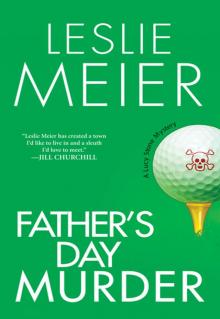 Father’s Day Murder
Father’s Day Murder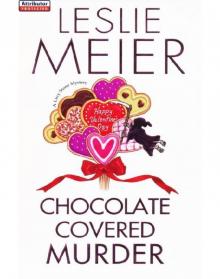 Chocolate Covered Murder
Chocolate Covered Murder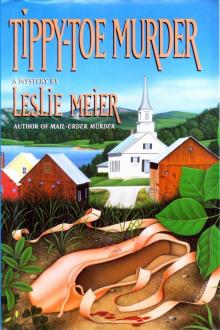 Tippy Toe Murder
Tippy Toe Murder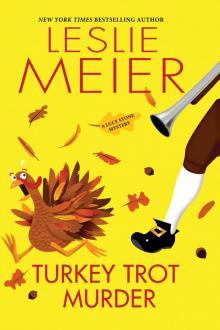 Turkey Trot Murder
Turkey Trot Murder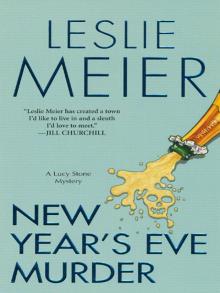 New Year's Eve Murder
New Year's Eve Murder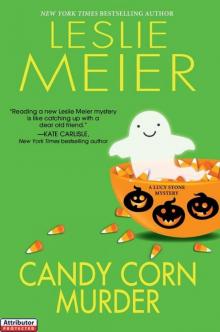 Candy Corn Murder
Candy Corn Murder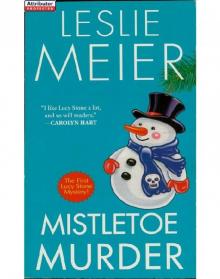 Mistletoe Murder
Mistletoe Murder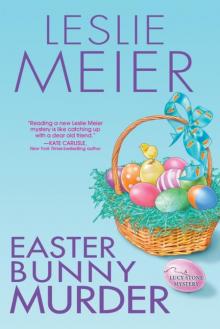 LStone 20 - Easter Bunny Murder
LStone 20 - Easter Bunny Murder Mother's Day Murder
Mother's Day Murder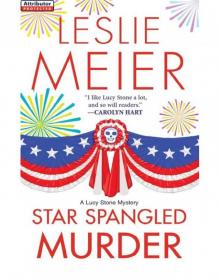 Star Spangled Murder
Star Spangled Murder Silver Anniversary Murder
Silver Anniversary Murder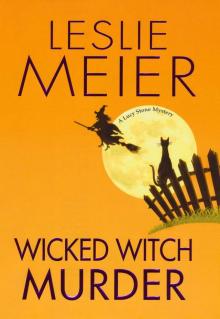 Wicked Witch Murder
Wicked Witch Murder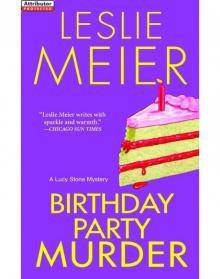 Birthday Party Murder
Birthday Party Murder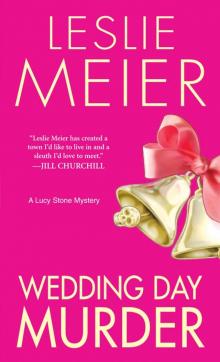 Wedding Day Murder
Wedding Day Murder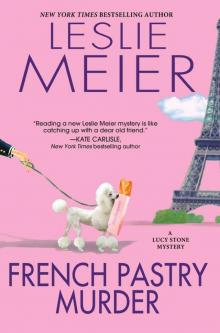 French Pastry Murder
French Pastry Murder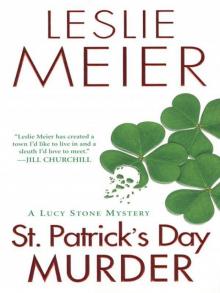 St. Patrick's Day Murder
St. Patrick's Day Murder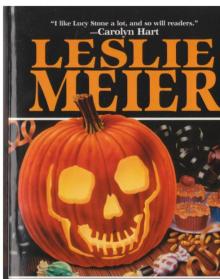 Trick or Treat Murder
Trick or Treat Murder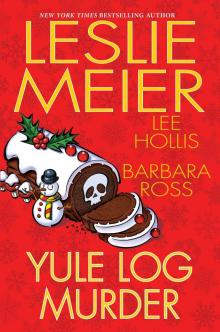 Yule Log Murder
Yule Log Murder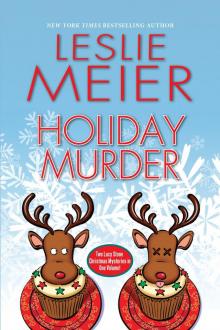 Holiday Murder
Holiday Murder British Manor Murder
British Manor Murder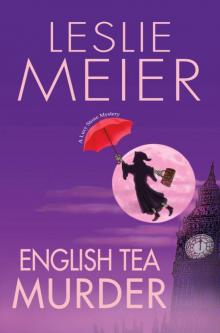 English Tea Murder
English Tea Murder